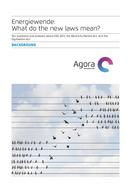The transformation of Germany’s electricity sector through the adoption of renewable energy – known in German as the Energiewende – is in full swing. Between 2000 and 2015, the share of Germany’s electricity consumption covered by renewables rose from 6.5 to 31.6 per cent. By 2050, the German government plans to raise this share to at least 80 per cent.
As part of these efforts, the German federal government, together with the Bundestag, has amended a number of important regulations. The most important are:
- The German Renewable Energy Sources Act (EEG): An amended EEG was passed in 2016 and slated to come into effect at the beginning of 2017 (henceforth referred to as EEG 2017).
- The Electricity Market Act (Strommarktgesetz): This act, which passed into law at the end of July2016 after three years of talks, further modernizes the electricity market.
- The Act on the Digitisation of the Energy Transition (Digitalisierungsgesetz): Passed in the summer of 2016 by the German Bundestag and Bundesrat, this law provides for the introduction of smart meters that promote the Energiewende.
- Federal Requirement Plan Act (Bundesbedarfsplangesetz): Dating from 2016, this act updates the list of urgent transmission-grid expansion projects and sets forth new rules for deploying underground power lines.
- Combined Heat and Power Act 2016 (Kraft-Wärme-Kopplungsgesetz 2016): This act represents the amended version of legislation promoting combined heat and power. In August of 2016, Germany came to an agreement with the EU Commission on the legal aspects of state aid.
- Incentive Regulation Ordinance (Anreizregulierungsverordnung): This ordinance, passed in June of 2016, rewrites regulations on costs that grid operators can bill to customers.
The changes to these regulations have been and continue to be accompanied by hopes for and concerns about the progress of Germany’s Energiewende. While the German federal government sees the package of laws and directives as a fundamental and indispensable requirement for a successful continuation of the Energiewende and hopes for more competition in the expansion of renewable energy, others fear a slowdown or even a failure of the country’s transformation efforts.
The main changes concern the EEG, the Electricity Market Act, and the Act on the Digitisation of the Energy Transition. In this background paper, Agora Energiewende explains the most important elements of these new regulations and analyses how they will affect the transformation of the German energy sector.







